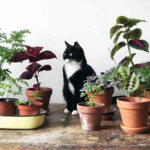You’re petting your feline friend, and then you see it – the tip of their tiny tongue peeking out, a cute and quirky moment known as a “Blep Cat” phenomenon. It’s undeniably adorable, ranking high on the scale of cute cat behaviors. But beyond the charm, you might wonder, “Why do cats blep?” Is it just to be cute, or is there a deeper meaning behind this tongue-out display? This article delves into the common reasons for cat blepping, exploring both behavioral and medical explanations to understand your blep cat better.
What Exactly is a ‘Blep Cat’?
The term “blep” playfully describes when a cat, or sometimes other animals, lets their tongue stick out just a little bit. It’s as if they’ve forgotten to retract it after grooming, licking, meowing, or simply relaxing. This behavior, often seen as a “blep cat” moment, is actually quite common among felines. While it undeniably boosts their cuteness factor, the question remains: is it just a random quirk, or is there more to why a cat becomes a blep cat?
Read More: Why Do Cats Stick Their Tongue Out?
Unpacking the Mystery: Why Do Cats Blep?
While it might seem like your cat is blepping solely to enchant you, there are various underlying reasons for this behavior. Interestingly, even though they aren’t consciously trying to make you adore them more, your positive reaction might play a role! Let’s explore the common causes behind why your cat might become a blep cat:
1. Scent Investigation and the Blep Cat
Cats possess a remarkable ability to communicate and understand their world through scent. They gather information about their surroundings and fellow creatures by detecting pheromones, which are essentially smelly chemical compounds.
Their tongue acts as a collection tool for these pheromones. While taste buds get to work on flavor, cats also have specialized receptors to interpret the scent’s meaning. This fascinating process involves the flehmen response. During flehmen, a cat will curl their lips to facilitate the transfer of pheromones to the vomeronasal organ, also known as Jacobson’s organ, located on the roof of their mouth. Sometimes, in the midst of this intense olfactory investigation, their tongue might just… blep.
2. The Power of Positive Reinforcement and the Blep Cat
While dogs are often lauded for their trainability, cats are also intelligent and capable of learning through association. Cats frequently adjust their behavior to please their beloved humans, often to earn rewards like cuddles, tasty treats, or verbal praise.
If you react positively—perhaps with delighted coos and chin tickles—when you spot your cat blepping, they’re likely to take note. You might soon observe them blepping intentionally, seemingly to elicit those sweet words, chin scratches, or yummy snacks. This phenomenon is known as positive reinforcement, a well-established and effective pet training technique. Your adorable “blep cat” might just be a clever strategist!
3. Oral Discomfort and the Blep Cat
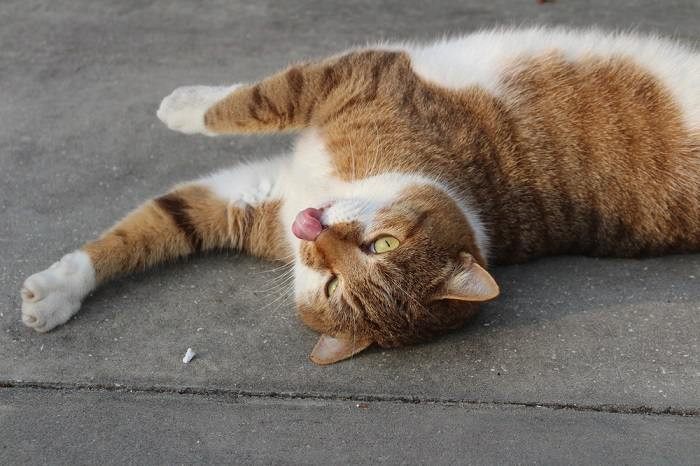 Why do cats blep when sleeping
Why do cats blep when sleeping
Sometimes, a blep cat isn’t showcasing cuteness, but rather discomfort. Oral issues could be the culprit behind your cat’s tongue sticking out.
If a cat is suffering from sore gums, stomatitis, or inflammation and infections stemming from periodontal disease, their mouth is likely causing them considerable pain. In such cases, your feline companion might find it more comfortable to let their tongue loll out slightly, rather than keeping it fully enclosed within their mouth. This can also occur if your cat has mouth ulcers due to advanced kidney disease, or if they’ve licked caustic or irritating substances.
Alongside blepping, other signs of oral discomfort might include excessive drooling, a decreased appetite, and noticeably bad breath. If you observe these symptoms along with the blep, a veterinary check-up is advisable.
4. Nausea and the Blep Cat
When cats feel nauseous, they often produce excessive saliva, leading to increased drooling. This abundance of saliva in their mouth can cause them to relax their mouth muscles or keep their mouth slightly open. Consequently, their tongue may naturally poke out a little, resulting in a blep. If nausea is the reason behind the blep cat behavior, you might also notice other signs of illness, such as vomiting, loss of appetite, or diarrhea.
5. Respiratory Distress and the Blep Cat
While panting is a normal behavior for dogs, it’s often a sign of breathing difficulty in cats. If your cat is open-mouth breathing, you might observe their tongue protruding. Open-mouth breathing in cats is frequently an emergency situation, so immediate veterinary attention is crucial. While less common, a blep accompanied by labored breathing warrants urgent concern.
6. Interruption and Distraction: The Accidental Blep Cat
If you’re a cat owner, you’ve likely witnessed the meticulous grooming rituals of your feline friend. It’s undeniably charming to watch them lick their paws and meticulously clean behind their ears. However, have you ever noticed your cat pausing mid-grooming due to a sudden distraction?
A frequent cause of cat blepping is simply being interrupted or distracted during a grooming session. They might be partway through licking their nose or paws when a sudden sound or movement catches their attention, causing them to momentarily “forget” to retract their tongue fully, leading to an adorable, albeit accidental, blep cat moment.
7. Relaxation and Contentment: The Blissful Blep Cat
When your cat is in a state of deep relaxation, contentment, or is happily purring away, you might notice their tongue peeking out a bit. If you’re particularly “lucky,” your relaxed cat might even start drooling slightly!
This occurs because, during moments of contentment or when drifting off to sleep, a cat’s jaw muscles relax. This relaxation can cause the mouth to open just a tiny bit, creating a perfect little gap for the tip of the tongue to sneak through, resulting in a picture-perfect relaxed blep cat.
8. Missing Teeth and the Blep Cat
One of the factors that usually keeps a cat’s tongue neatly inside their mouth is the presence of their teeth, which act as a natural barrier. If a cat is missing some of their larger teeth, particularly their canine teeth (the prominent fangs), their tongue might slip out more readily. The absence of these dental anchors can contribute to a more frequent “blep cat” appearance.
When Should You Worry About Your Blep Cat?
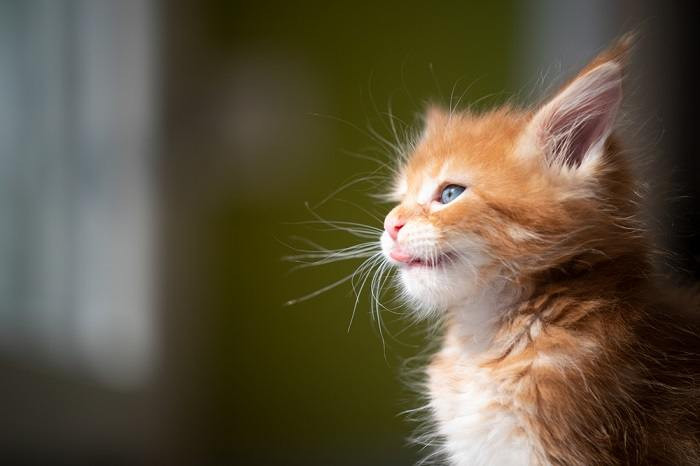 Notice Your Cat ‘Blepping-compressed
Notice Your Cat ‘Blepping-compressed
Generally, blepping is a harmless and often endearing behavior in cats. If your feline companion is a regular “blepper,” and they have had routine veterinary check-ups confirming good health, there’s typically no cause for concern. Blepping can simply be a normal quirk of cat behavior, and many owners find it so charming they might even jokingly encourage their cats to become blep cats!
However, a sudden onset of blepping in a cat that doesn’t usually exhibit this behavior could signal an underlying issue. This is especially true if the blepping is accompanied by other symptoms like a reduced appetite, pawing at their face, excessive drooling, unexplained weight loss, or bad breath.
If you are at all concerned that your cat’s blepping might be abnormal or indicative of a health problem, it’s always best to schedule an appointment with your veterinarian or consult with a certified cat behavior consultant for professional advice and reassurance.
In Conclusion: The Enigmatic Blep Cat
There’s no denying the undeniable charm of a blep cat. These moments of tongue-out adorableness are a joy for cat lovers. However, it’s crucial to remember that blepping can sometimes be a subtle indicator of a medical issue. Therefore, if your cat’s blepping behavior is new or accompanied by other changes in their health or demeanor, seeking guidance from a veterinarian or a qualified animal behaviorist is a wise step to ensure your blep cat is happy and healthy.
Read More: Mouth Cancer In Cats: Causes, Symptoms & Treatment
Frequently Asked Questions About Blep Cats
Is it normal for cats to BLEP?
Yes, in many cases, blepping is perfectly normal for cats. There are numerous reasons why a cat might blep, and many of them are benign. Cats utilize blepping as a way to explore their environment through scent and pheromones, and sometimes, they might even blep to get your attention with their irresistible cuteness!
However, it’s important to be aware that blepping can also be a symptom of an underlying medical issue, such as oral pain, dental disease, nausea, or exposure to toxins. Therefore, if your cat’s blepping seems unusual for them, or if they are showing any signs of illness, consulting with your veterinarian is always recommended.
Why does my cat’s tongue stick out a little?
If your cat’s tongue has started sticking out more than usual, several factors could be at play. It could be as simple as missing teeth, which reduces the natural barrier that keeps their tongue in place. Alternatively, it could be a sign that they are feeling unwell, experiencing pain, or having difficulty breathing. The key is to observe whether this tongue position is a new or unusual behavior for your cat. If it is, it’s prudent to have them examined by a veterinarian to rule out any potential health concerns.
What is the difference between a BLEP and a MLEM?
While both “blep” and “mlem” describe adorable tongue-related cat behaviors, they are distinct. A blep is characterized by the tongue simply hanging out, typically without movement and seemingly without a specific purpose. It often appears unintentional. Conversely, a “mlem” is an active licking motion. A cat “mlems” when they are actively licking something, whether it’s around their mouth, lapping up food or water, or grooming themselves.
Why is my cat blepping while sleeping?
Observing your cat blepping while sleeping is usually a sign of deep relaxation. When cats are asleep, they are at their most relaxed state. This deep relaxation extends to their jaw muscles, which can slacken and cause their mouth to open slightly. This slight opening can allow their tongue to slip out a little, resulting in a sleepy blep. If your cat only bleps while sleeping, consider it a positive sign – it indicates they feel secure and comfortable enough to be vulnerable and fully relaxed in their environment.
Want to give your cat better care every day? Get our free day to day care guide.
Based on advice from cat behaviorists, we’ve developed a step-by-step guide to a healthy routine that brings out your cat’s best. From daily habits to yearly must-do’s, we’ve laid out everything you need to set the foundation for a stress-free, happy life.
Inside the day to day guide, you’ll find:
- Easy to understand infographics
- Checklists for simple management
- Must-do’s for a healthy cat
Get your free guide! Get your free guide!
More to Explore About Cat Psychology
Cat Behavior
What the World Looks Like from a Cat’s Perspective
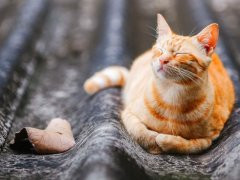 ginger cat laying on roof
ginger cat laying on roof
Cat Behavior
How Cold Is Too Cold for Cats?
Cat Behavior
Why Do Cats Bunny Kick? 3 Fascinating Reasons Behind This Behavior
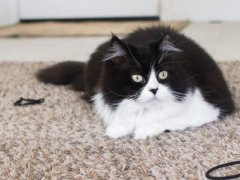 Cat lounging on a brown shag carpet, encompassed by black hair ties
Cat lounging on a brown shag carpet, encompassed by black hair ties
Cat Behavior
5 Adorable Reasons Why Cats Like Hair Ties
Popular in the Community
Cat Breeds
The 9 Friendliest & Nicest Cat Breeds In the World
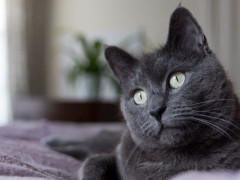 grey cat in bed
grey cat in bed
Cat Names
300 Best Grey Cat Names With Meanings
Cat Behavior
Why Do Cats Arch Their Backs? Top 8 Reasons
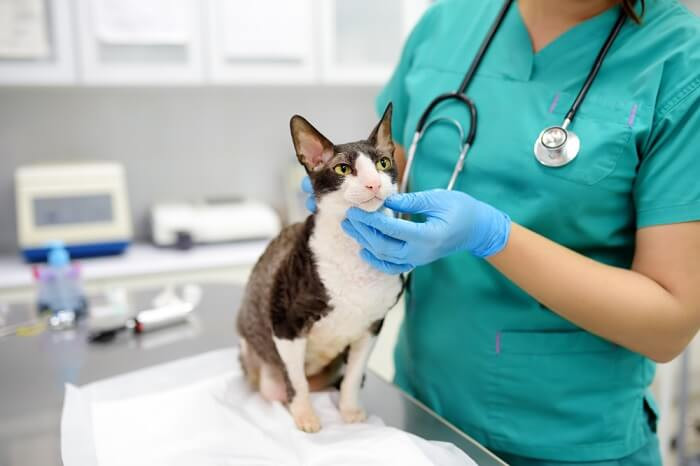 cat-vet-exams
cat-vet-exams
Cat Safety Advice
Top 10 Things Your Vet Wishes You Knew

